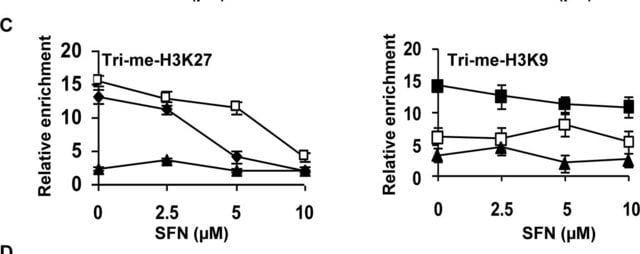DNTPCA2
CleanAmp™ dNTP
Modified dNTP set for hot-start PCR, 2 μmol of each dNTP
Sinónimos:
Deoxynucleotides, dNTP, dNTP Mix
Iniciar sesiónpara Ver la Fijación de precios por contrato y de la organización
About This Item
UNSPSC Code:
41106305
Productos recomendados
form
liquid
quality
2 μmol of each dNTP
feature
hotstart
concentration
50 mM (each dNTP)
color
colorless
shipped in
dry ice
storage temp.
−20°C
¿Está buscando productos similares? Visita Guía de comparación de productos
General description
CleanAmp dNTPs, are a product of TriLink BioTechnologies, Inc. CleanAmp dNTPs are modified nucleoside triphosphates that block DNA polymerase nucleotide incorporation. CleanAmp dNTPs are activated by the initial heating step and subsequent denaturing steps in typical hot start PCR cycling conditions. This process limits the amount of activated dNTPs during each cycle of PCR, allowing for more specific and efficient amplification of the desired product and also reducing or completely avoiding mis-priming or primer dimer formation. CleanAmp dNTPs provide a more affordable solution than hot start enzymes for a variety of PCR-based applications.
Application
- For PCR amplifications that require reduced non-specific amplification
- For multiplex PCR
- For reduction of primer dimers
- Substitute for dNTPs in any PCR reaction
Packaging
2 μmoles: 4 vials:
40 μL dATP at 50 mM in buffered glycine solution
40 μL dCTP at 50 mM in buffered glycine solution
40 μL dTTP at 50 mM in buffered glycine solution
40 μL dGTP at 50 mM in buffered glycine solution
40 μL dATP at 50 mM in buffered glycine solution
40 μL dCTP at 50 mM in buffered glycine solution
40 μL dTTP at 50 mM in buffered glycine solution
40 μL dGTP at 50 mM in buffered glycine solution
Legal Information
CleanAmp™ dNTPs are provided to buyer with a non-transferrable right from TriLink BioTechnologies, Inc. to use the purchased CleanAmp™ dNTPs in internal research conducted by the buyer, whether the buyer is an academic, non-profit, or for-profit entity. CleanAmp™ dNTPs are not to be used for human therapeutic or commercial clinical diagnostic use. A license is required for any commercial use of CleanAmp™ dNTPs, regardless of the academic or non-profit status of the using entity. Information about commercial licenses for CleanAmp™ dNTPs may be obtained from TriLink BioTechnologies, Inc. Buyer may not use the CleanAmp™ dNTPs to support the filing of a patent application in any country in the world that contains claims directed to CleanAmp™ dNTPs or uses thereof without the express approval of TriLink BioTechnologies, Inc. Buyer′s right to have and use the CleanAmp™ dNTPs will terminate immediately if you fail to comply with these terms and conditions of this agreement.
CleanAmp is a trademark of TriLink BioTechnologies, Inc.
related product
Referencia del producto
Descripción
Precios
Storage Class
12 - Non Combustible Liquids
flash_point_f
Not applicable
flash_point_c
Not applicable
Certificados de análisis (COA)
Busque Certificados de análisis (COA) introduciendo el número de lote del producto. Los números de lote se encuentran en la etiqueta del producto después de las palabras «Lot» o «Batch»
¿Ya tiene este producto?
Encuentre la documentación para los productos que ha comprado recientemente en la Biblioteca de documentos.
Xinglong Xiao et al.
Journal of virological methods, 187(2), 357-361 (2012-11-13)
Nucleic acid testing (NAT) is valuable for screening blood donors for occult hepatitis B virus (HBV) infection and infection during the window period in countries where HBV is endemic, such as China. An "in-house" NAT (Triplex NAT) was developed for
Franck Court et al.
Nucleic acids research, 39(14), 5893-5906 (2011-04-12)
Parental genomic imprinting at the Igf2/H19 locus is controlled by a methylation-sensitive CTCF insulator that prevents the access of downstream enhancers to the Igf2 gene on the maternal chromosome. However, on the paternal chromosome, it remains unclear whether long-range interactions
Inna Koukhareva et al.
Nucleic acids symposium series (2004), (52)(52), 259-260 (2008-09-09)
Several 3'-ether and 3'-ester derivatives of 2'-deoxyribonucleoside 5'-triphosphates (dNTPs) were prepared. These dNTP derivatives were not substrates for DNA polymerase and did not support primer extension at room temperature. However, by short pre-heating to 95 degrees C in PCR buffer
Natasha Paul et al.
Methods in molecular biology (Clifton, N.J.), 630, 301-318 (2010-03-20)
Hot Start activation approaches are increasingly being used to improve the performance of PCR. Since the inception of Hot Start as a means of blocking DNA polymerase extension at lower temperatures, a number of approaches have been developed that target
Elena Hidalgo Ashrafi et al.
Current protocols in molecular biology, Chapter 15, Unit 15-Unit 15 (2009-10-10)
Hot-start PCR is a technique that improves PCR performance by reducing nonspecific amplification during the initial setup stages of the PCR. This unit describes hot-start PCR protocols which utilize primers containing temperature-sensitive modifications. The introduction of 4-oxo-tetradecyl (OXT) phosphotriester groups
Nuestro equipo de científicos tiene experiencia en todas las áreas de investigación: Ciencias de la vida, Ciencia de los materiales, Síntesis química, Cromatografía, Analítica y muchas otras.
Póngase en contacto con el Servicio técnico








